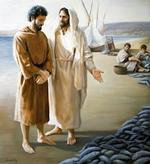Catechism of the Catholic Church
Share this paragraph of the Catechism:
Paragraph:
1375 It is by the conversion of the bread and wine into Christ's body and blood that Christ becomes present in this sacrament. The Church Fathers strongly affirmed the faith of the Church in the efficacy of the Word of Christ and of the action of the Holy Spirit to bring about this conversion. Thus St. John Chrysostom declares:
It is not man that causes the things offered to become the Body and Blood of Christ, but he who was crucified for us, Christ himself. The priest, in the role of Christ, pronounces these words, but their power and grace are God's. This is my body, he says. This word transforms the things offered. 204And St. Ambrose says about this conversion:
Be convinced that this is not what nature has formed, but what the blessing has consecrated. The power of the blessing prevails over that of nature, because by the blessing nature itself is changed.... Could not Christ's word, which can make from nothing what did not exist, change existing things into what they were not before? It is no less a feat to give things their original nature than to change their nature. 205
Move forward or back a paragraph: Previous | Next
Where this paragraph appears in the Catechism:
TABLE OF CONTENTS
» |
PART TWO: THE CELEBRATION OF THE CHRISTIAN MYSTERY |
» |
SECTION TWO: THE SEVEN SACRAMENTS OF THE CHURCH |
» |
CHAPTER ONE: THE SACRAMENTS OF CHRISTIAN INITIATION |
» |
ARTICLE 3: THE SACRAMENT OF THE EUCHARIST |
» |
V. THE SACRAMENTAL SACRIFICE THANKSGIVING, MEMORIAL, PRESENCE |
Notes for the above paragraph:
204 St. John Chrysostom, prod. Jud. 1:6: PG 49, 380.205 St. Ambrose, De myst. 9, 50; 52: PL 16, 405-407.
English Translation of the Cathechism of the Catholic Church for the United States of America © 1997, United States Catholic Conference, Inc.






